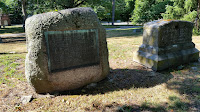 |
| "Little Rascals" Google image. |
The dog is man’s best friend. Well that’s what we’ve been told. Scruffy.
Rover. Lassie. Rin Tin Tin.
Snoopy. When you hear names like
that you think of sweet little puppies and doggie heroes. To some when they hear the bark of a dog it’s
like hearing a voice say, “Hey I’m over here.
Let’s play fetch.” A wagging tale
means, “Gee, I like you.” To me a
barking dog has the same effect as the open jaws of a great white, or the
tell-tale rattle of a rattle snake. Why
you ask? Well, let me tell you.
Mike’s Field was the place to play when I was little. It was the only piece of grassland in my
neighborhood of close 3 story tenements.
It had tall grass and the only trees that you could climb in. In order to get to Mike’s you had to walk up
Broadway Street. It wasn’t far, but you
had to pass the Goons house. I don’t
know if anyone knew their real name so we just called them the Goon
family. There were 2 boys who were in their 20s and just sat on
their porch with their old haggard mother.
If they were on the porch, you ran by their house. And if they weren’t, you looked in the
windows often to see one of them looking back at you. Like an added incentive to get past the house
as quick as you could there was a dog.
Not some sweet little pup. Not a
fancy looking poodle or a friendly retriever.
No the Goons owned the biggest, meanest, most ornery German shepherd you
ever met. Its fur was the color of coal. Its paws were big enough to make indents in
the ground where it stalked. If you
looked in its eyes you became hypnotized like a cobra does with its prey. The one thing that separated us from the Goon
dog was a six foot fence that surrounded their property. There was no way for the Goon dog to get
out. Or so I thought.
It was July. The locusts
were making that sound they make when it gets hot. The sun was high in the sky. We were all playing army. There was Ricky, Johnny, Harold, Ricky’s
brother Ronny and FraFra. FraFra was
crazy and would eat anything. He once
swallowed a quarter and would proudly show it off after it made its way
out. Later that summer he ate a live
hornet. That’s another story.
As soldiers we were planning our attack on the enemy. We were leading a charge to bomb their
headquarters. Between the yells of the
attacking forces there was another sound.
It was deeper than the rest. The
others heard it too. Time stopped. Without turning around I knew it was behind
me- the Goon Dog. My friends saw him
before I did. I saw fear in their
faces. RUN someone commanded. Fear took hold of my feet I couldn’t go
anywhere. I felt his breath before I
felt the pain. Goon Dog had me on the
ground and stood over me. He outweighed
me and I lay there like a opossum. The
growl came from deep with him. His teeth
were bared and drool dangled from his mouth.
The next thing I remembered was the sound of the locusts and
staring into the sun. I was still there
lying on my back. My friends had
deserted me. I looked around and Goon
Dog was gone. I looked to my left and
there was one of the Goon Boys standing by the 6 foot fence. All I could see was his outline with his
hands leaning on the fence but I knew he was looking at me.
Did he unleash the dog on us? Or had he saved me from the beast. I’d never know. But when I hear a barking dog once again I’m
a little kid in Mike’s Field with the
hot breath of killer beast breathing down my neck.
